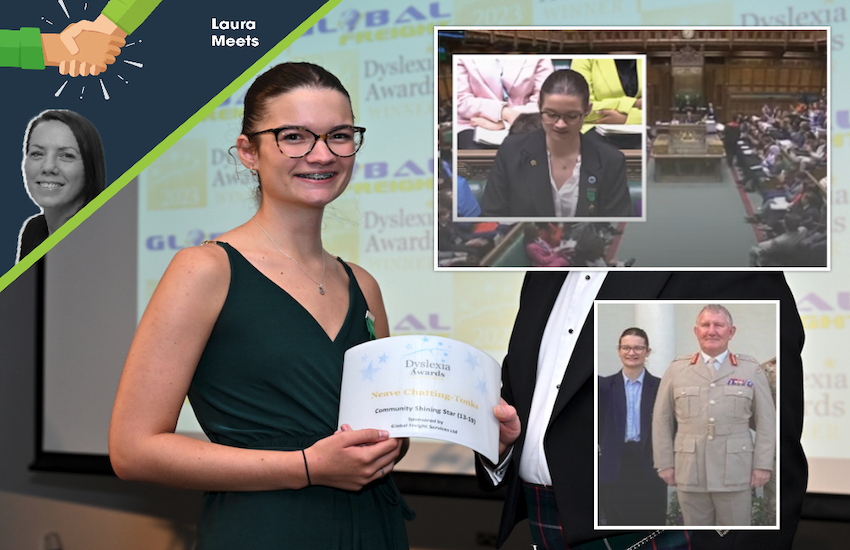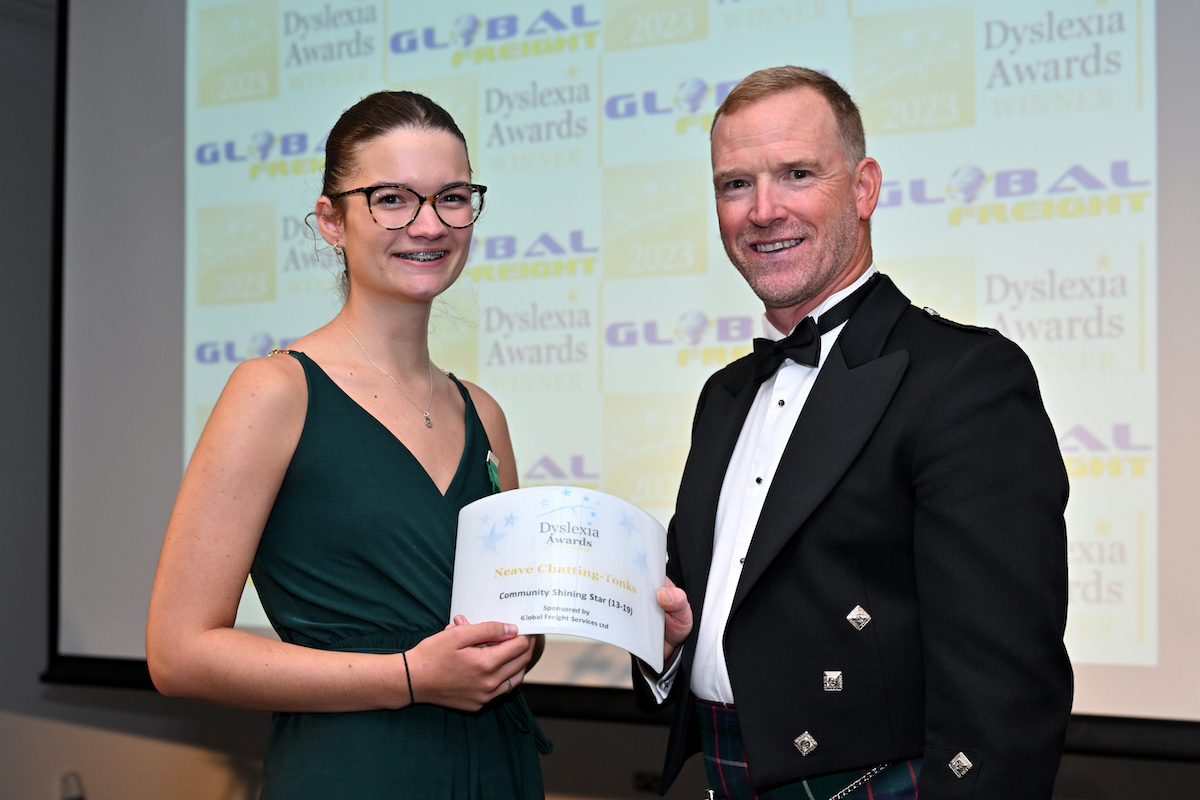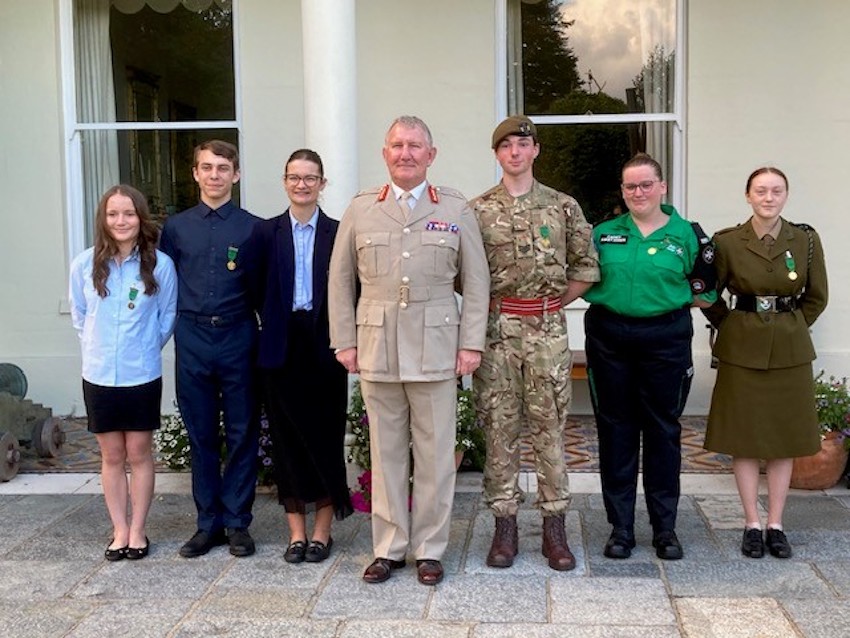


It's very rare to meet someone so young who is as inspirational as Neäve Chatting Tonks, but spend an hour in her company and you'll be believing that you can do anything if you put your mind to it.
Despite her own personally acknowledged academic struggles, she has secured a full time job immediately on leaving school which is helping her plan her professional and personal future.
Aside from work, over the past few months Neäve has:
She's just 16 but by any age that's quite a list of achievements for less than one year.
Neäve first came to my attention when she won a national Dyslexia Award for being a Community Shining Star. That came as a real shock to her, said Neäve.
"I struggled academically in school with dyslexia and it wasn't for me," she said simply.
Like many others, for Neäve, dyslexia presents in multiple ways.
"...the words are running around the page," she said. "If it's a different colour background, if it's not white, it's easier to read because the black stands out more.
"When you're reading a sentence sometimes, for me personally, I jump words or I mix them up, so I always have to have my finger on the page when I'm reading."

Pictured: Neäve Chatting Tonks receiving her Community Shining Star award at the national Dyslexia Awards.
"I was diagnosed when I was seven when I was living in Spain. My dad had dyslexia and I was showing signs of having dyslexia, I was really struggling to read and write, my spelling was not great, it was awful. Then I was diagnosed when I was seven and it was kind of just like, 'yeah, you have dyslexia, right?'."
Neäve's family moved back to Guernsey when she was young and she had support at primary school before moving to Ladies' College during her secondary years.
As she grew, Neäve said she realised that dyslexia can affect people in the way they pronounce or spell words, while some will get headaches or suffer from poor concentration.
"...but some people can be all of it," she said, "there's so many more symptoms - you'll get more headaches, concentration you could find really hard, like I really struggled to concentrate for a long period of time.
"It's one of the reasons I struggled with sitting exams, but I did have extra time so I did have that benefit.
"But it's also like if your mum tells you to do the dishwasher, the hoovering and do the washing, it's too much information in one go. It's not just all spelling and words, it's really because your brain's working 10 times harder trying to figure out what that word says on that page and you're trying to process everything which takes so much longer so you get more tired and it comes in different ways.
"I only recently knew that when my mum tells me do this and that I just always forget. I thought I'm just a lazy teenager you know, but then there's reasons behind it, which I don't think is spoken about enough at all."
Neäve said the 2023 Dyslexia Award's win came as a surprise to her and she still doesn't know who nominated her.
Pictured: Neäve Chatting Tonks.
For winning the Community Shining Star award, Neäve travelled to the UK to receive her prize.
"...it's just showing that giving it a go, for any opportunity, even if you have dyslexia and you struggle with writing, speaking or anything like that, do not let it hold you back," she said.
"It was something that I had never heard of and then the next thing I knew I was shortlisted, but to get shortlisted I had to send people a link to fill in to write nice stuff about me. That felt a bit like not wrong, but I had to ask them because I knew I'd been nominated and to get shortlisted you have to get more votes, if that makes sense.
"So then I had to send out links to school teachers, club teachers and all of them and when we were flying over, my dad knew I was the winner but I didn't know."
Summing up her award win, Neäve said it was "just amazing" and added "...it was really nice to be noticed and it was nice to be shining a light on dyslexia in a positive way."
This award win came not long after Neäve had made the decision to leave education behind her and get a job.
"It's not for everyone and it wasn't for me," she said, about her school days.

Pictured: Neäve Chatting-Tonks is Chair of the Youth Forum which is run by the Youth Commission.
"I struggled quite a lot in school so when I finished school, I looked into Sixth Form and decided, 'you know what? it's not going to be really for me. I'm only going to be doing it because my friends are going to be doing it'.
"I didn't really want to do it. None of my family had done A Levels before, my siblings didn't do it, my mom and dad did but I just decided it wasn't for me. So I started looking out for jobs, then I got a job offer and I took the job."
After completing her GCSE exams she had some time off over the summer with her friends, before starting at her first full time job in October.
Although she's asked not to identify where she is working, Neäve said her employer has been very supportive of her in all of her interests. She's also reaping the benefits herself, she said.
"I don't think anything will prepare you for it. It does almost make you a bit more mature because I'm working with a lot older people, so, yes, it's different especially with the shift patterns as I do struggle to see my friends. I try to see them as much as possible but my weekends don't always line up with the weekend so it's quite hard to see my friends but once you get in the swing of it, it's ok."
Working a shift pattern of six days and three days off, with early and late shifts spread among those days, she says one benefit is being able to save her own money.
"...it's also a sense of achievement," she said, "a different type of sense of achievement that I've had from being in school. I'm being able to pay for my first car and driving lessons and all that but my parents are wonderfully proud."
One area in which Neäve says her employer is supportive is by backing her to do the Gold Duke of Edinburgh Award Scheme.
It was through her volunteering for her bronze DofE that she first came into contact with the Youth Commission and that in turn led her to be appointed a Lieutenant Governor's Cadet and to be asked to speak at the UK House of Commons.
"I love working in a team and just getting young people's voices heard is what my main aspiration was, so I did that for my bronze volunteering and then I loved it so much that I carried on to join the Youth Forum and I was recently elected to be Chair of the Forum so that was a really big achievement for me, definitely."

Pictured: Neäve Chatting Tonks and her fellow Lieutenant Governor Cadets, with His Excellency.
Neäve's appointment as a Lieutenant Governor's Cadet started in September, for one year.
"We do the public services such as Remembrance Day and Liberation Day. We stand with the Governor and at least once a month, two of the cadets meet with the Governor.
"There's so many other opportunities that come with it, endless opportunities like the things that you don't think of, you get an email 'do you want to do this?' They're really wanting to get young people's voices heard....they really want the best for us."
Asked what the Governor himself is like, Neäve said that His Excellency, Lieutenant General Sir Richard Cripwell is "so lovely".
"He's really lovely. He's not scary at all. He's a big army man, but he's not scary...he's really lovely.
"He really wants to get involved in the community that he looks over as much as he can. He doesn't want to sit and say 'that's my job done', he wants to get involved with the community and I think that's why his cadets are so important to him, he wants to know what's going on in the island and with the youth."
These positions led Neäve to the UK House of Commons last month where she was asked to speak on behalf of Guernsey as one of the three representatives for the Crown Dependencies.
She, and peers from Jersey and the Isle of Man were each asked to write and present a speech on the most important issue facing equality on the islands today.
"I went for bullying and the ageing population and voting."
"There are things that from being on the forum really stood out to us, obviously having an ageing population, and young people don't feel the need to put their vote forward but actually who we're voting for has got the role of deciding what the future holds for us so the importance of that is voting for who we want to see next in charge and that's who we're voting for.
"To be able to vote for them is something really important because you're old enough to vote and something that we're trying to work on is actually making people aware that you can vote from the age of 16."
With regards bullying, Neäve's speech focused on encouraging others - in Guernsey, the other Crown Dependencies, and elsewhere - to stand up for others and to not be a bystander if we see discrimination in action.
"It was just trying to let people know that bullying is happening around them and to not be a bystander in the face of discrimination, whether that's discrimination against sexuality or ethnicity or...the speech was more to make people aware that the numbers are increasing significantly throughout the years and to make people aware that it is happening around them, so if they can see it or if they notice it to stand up for (others), you've just got to put yourself in their shoes.
"If that was you, you'd want to be that person that says 'that's not right'.
"You want to be in that perspective, and is there more that we as a community can do to stop this happening or is it because it's through social media and the technology that we've all got in our hands and in our pockets?"
WATCH: Neave speaks on behalf of Guernsey's youth
Comments
Comments on this story express the views of the commentator only, not Bailiwick Publishing. We are unable to guarantee the accuracy of any of those comments.